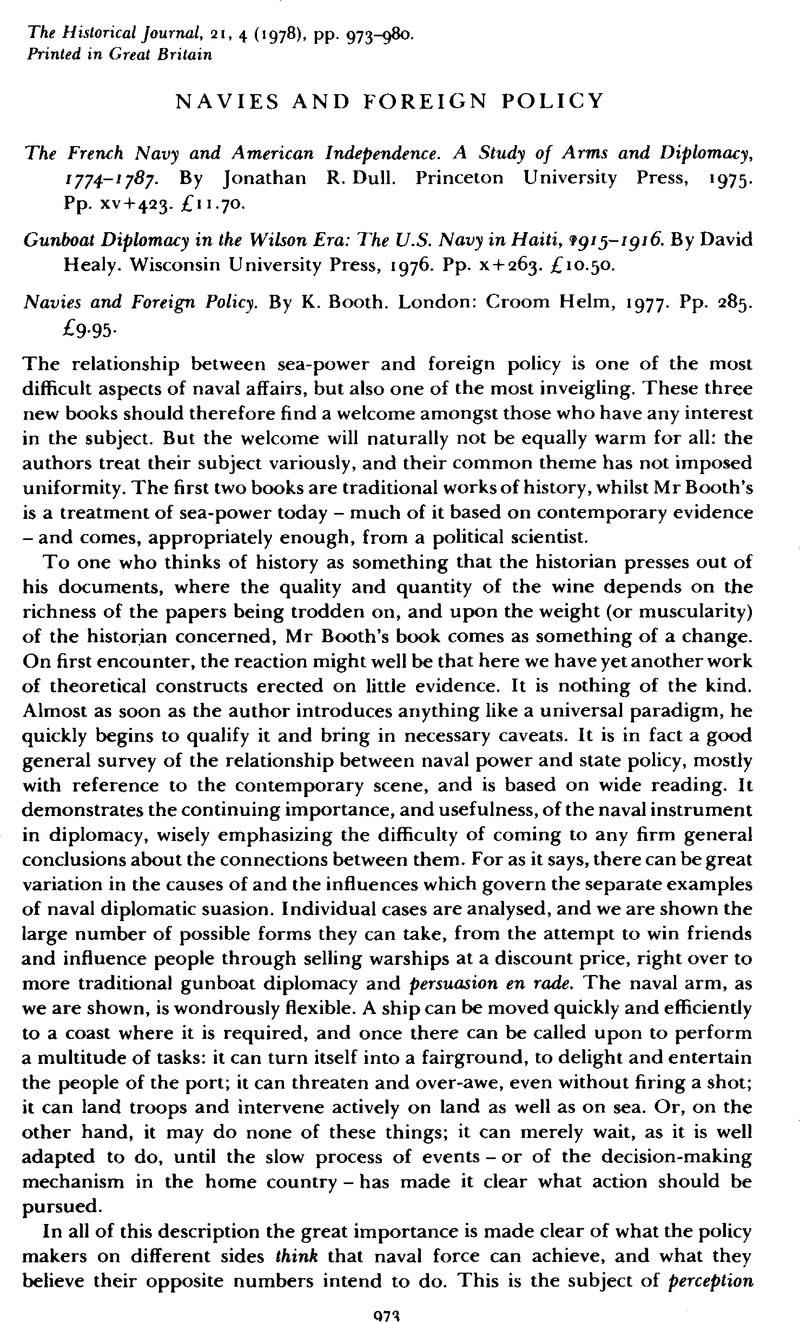No CrossRef data available.
Article contents
Navies and Foreign Policy
Published online by Cambridge University Press: 11 February 2009
Abstract

- Type
- Review Articles
- Information
- Copyright
- Copyright © Cambridge University Press 1978
References
1 For a good recent treatment of perception in foreign policy making, and a survey of the literature, see the book by Jervis, Robert, Perception and misperception in international politics (Princeton, 1976).Google Scholar
2 Luttwak, Edward N., The political uses of sea power (Johns Hopkins U.P., 1974)Google Scholar. MccGwire, Michael (ed.), Soviet naval developments: capability and context (New York, 1973)Google Scholar. MccGwire, Michael, Booth, Ken, McDonnell, John (eds.), Soviet naval policy: objectives and constraints (New York, 1975)Google Scholar. Cable, James, Gunboat diplomacy (London, 1971)Google Scholar. Martin, L. W., The sea in modern strategy (London, 1967).Google Scholar
3 Booth, , Navies, pp. 224, 159.Google Scholar
4 Allison, G. T., ‘Conceptual models and the Cuban missile crisis’, American Political Science Review, LXIII (09, 1969), 690Google Scholar. Later expanded into a book, Essence of decision, explaining the Cuban missile crisis (Boston, 1971) . For a different approach to the same problem see the interesting book, apparently unused by Booth, by Steinbruner, John, Cybernetic decision-making (Princeton, 1974)Google Scholar. Booth, , Navies, p. 137.Google Scholar
5 Healy, David, The U.S. in Cuba, 1898–1902: generals, politicians, and the search for policy (Wisconsin, 1963)Google Scholar, and U.S. expansionism; the imperialist urge in the 1890s (Wisconsin, 1970).Google Scholar
6 Dull, , The French navy, p. 109.Google Scholar
7 Moulton, J. L., ‘Convulsive war and prolonged confrontation’, Brassey's Annual (1970), p. 134.Google Scholar
8 Booth, , Navies, pp. 218Google Scholar ff., Dull, , The French navy, pp. 20, 102.Google Scholar
9 Allison, , ‘Conceptual models’, pp. 716, 709Google Scholar. Bowler, R. Arthur, Logistics and the failure of the British army in America, 1775–1783, (Princeton, 1975), p. viiiGoogle Scholar. Such shortages of information are of course not only limited to Britain. For Brandenburg-Prussia, for example, one may cite that standard work by Rosenberg, Hans, Bureaucracy, aristocracy and autocracy. The Prussian experience 1660–1815 (Boston, 1966), pp. 57 ff.Google Scholar
10 Dull, , The French navy, pp. 255–6.Google Scholar
11 Mackesy, Piers, The war for America, 1775–1783 (London, 1964), p. 169.Google Scholar
12 Dull, , The French navy, pp. 98, 121–2, 133.Google Scholar
13 Archives Nationales, B4132 (marine), pp. 29b–30a.
14 Dull, , The French navy, p. 151.Google Scholar
15 Booth fully admits this effect: Navies, p. 138.




